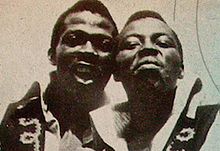Leonard Dillon
| The Ethiopians | |
|---|---|
 |
|
| Background information | |
| Origin | Jamaica |
| Genres | reggae, rocksteady, ska, roots reggae |
| Years active | mid-1960s-2011 |
| Labels | Sir JJ, Trojan Records, Heartbeat Records |
| Past members | Leonard Dillon Steven Taylor Aston Morris Melvin Reid |
The Ethiopians was one of Jamaica's best-loved harmony groups during the late ska, rocksteady and early reggae periods. Responsible for a significant number of hits between the mid-1960s and early 1970s, the group was also one of the first Jamaican acts to perform widely in Britain.
The Ethiopians was founded by Leonard Dillon (9 December 1942 - 28 September 2011) with Stephen "Tough Cock" Taylor and Aston "Charlie" Morrison at the tail end of the ska period. Dillon was a stonemason from the small community of Boundbrook, located on the outskirts of the northeast coastal town of Port Antonio, where he was raised by his grandparents in a strict Seventh Day Adventist household. With his grandfather the choirmaster in the local church, Dillon had good grounding in music from an early age. While still attending high school, he performed with a local act known as the Playboys (later re-named Ray and the Gladiators), the mellifluousness of his voice bringing the nickname "Sparrow".
Like many of his peers, Dillon moved to Kingston towards the end of his teen years in search of work, staying first in a tiny shack in the west Kingston slum of Back-O-Wall. He travelled to Fellsmere, Florida in 1963 on a seasonal farm work contract, and after returning to Kingston in 1964, he settled in Trench Town, lodging at the home of the aunt of popular sound system deejay King Sporty, who he knew from his days in Port Antonio. In Trench Town, Dillon met Peter Tosh, who introduced him to Bob Marley and Bunny Livingston, his fellow vocalists in the Wailers. An audition was swiftly arranged at Studio One, where the Wailers were recording some of the biggest hits of the day, which led to Dillon voicing his first material. Three songs were backed by the Wailers, including a sound system favourite called "Ice Water", based on lyrics of double entendre, while "Suffering On The Land" and "Beggars Have No Choice" were more concerned with the harshness of life in the ghetto; a fourth song, "Woman, Wine And Money", featured Delroy Wilson on harmony. All of the songs were issued on 7 in (180 mm) 45 RPM singles, credited to Jack Sparrow. Shortly after the release of these singles, through the efforts of the Ethiopian Reorganization Centre in Waterhouse (established by elders Nasser King and Daddy King), Dillon entered the Rastafari faith, which he remained committed to thereafter.
...
Wikipedia
